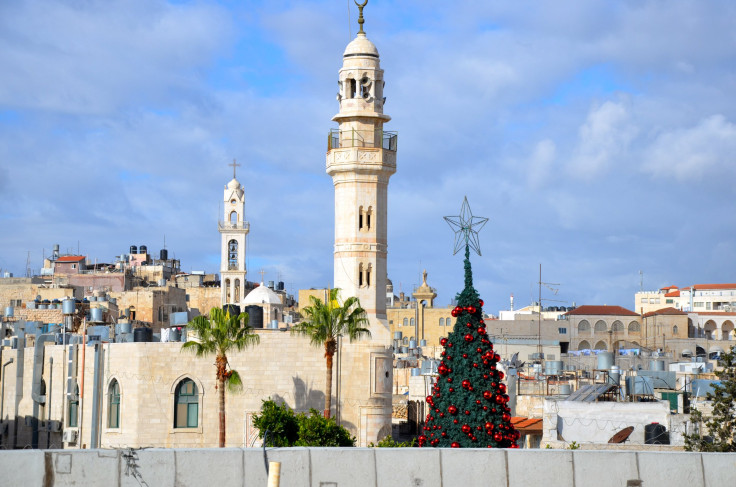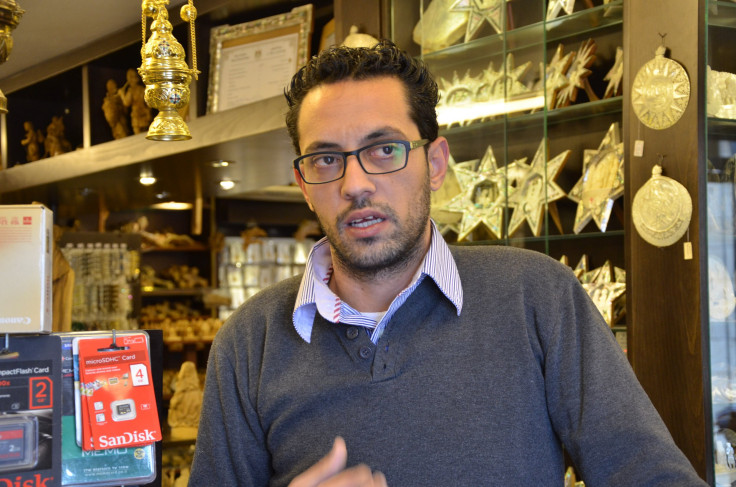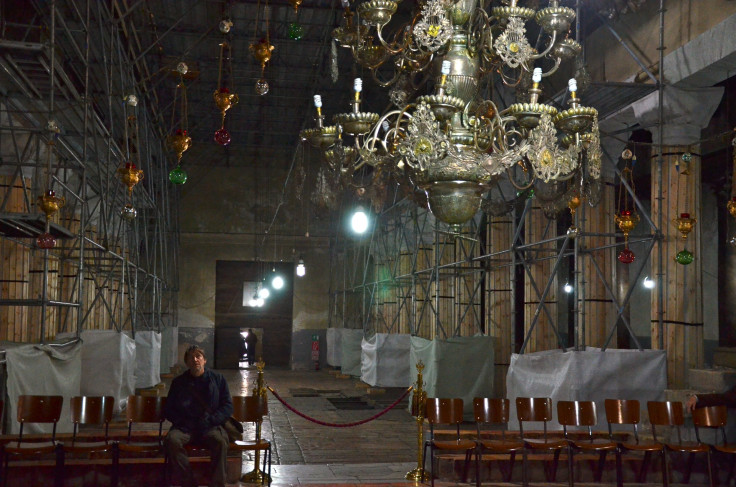Christmas In Bethlehem: A Rare Snowstorm, A Struggling Economy And A Chinese Christmas Tree Beside The Mosque

BETHLEHEM, West Bank -- It's the week before Christmas, and Manger Square is a hub of activity, with one of Christianity's most-beloved sites -- the Church of the Nativity – partially shrouded in scaffolding during a much-needed facelift. Arabic Christmas songs drift through the square among the falafel sellers, bright yellow taxis, contemporary Christmas decorations and, of course, shoppers. The Muslim call to prayer can be heard, at the usual intervals, from the Mosque of Omar, opposite the church.
For anyone who has ever wondered what Christmas is like in Bethlehem, the site where Christians believe the first one took place, here it is, 2013 years after the fact.
Snow melts underfoot in Manger Square, the plaza that surrounds the Church of Nativity, where Christians believe Jesus Christ was born. Businesses bordering the central hub of Bethlehem are unfurling a bit late this year, after the worst winter storm in the region since 1953; for them it is economic crunch time. The meteorological-induced downturn is added to an already-stagnant economy in the West Bank, which the local council is attempting to turn around.
An oversized (55 feet tall) artificial Christmas tree that was made in China stands beside the Church of Nativity, covered in shiny red baubles and a large metal star, steps from the Omar Mosque. Shops bordering Manger Square are fully stocked with Christmas wares for the masses of Christian tourists from all over the world who will pack the square on Christmas eve and day.
Nabil Giacaman, 30, who is Christian, helps his father Issa in the family shop, Christmas House, which sells holiday-themed ornaments and nativity scenes carved from local olive wood. When a reporter for International Business Times visited the shop just a week before Christmas, it was quiet after the bad weather, but business was slowly picking up.
Giacaman said local businesses are doing well, despite the setback posed when the municipality set up an outdoor Christmas market directly outside their shops, taking business away.
“Most of their stuff is made in China; ours is made locally and supports the locals," Giacaman said. "It is not common sense to set up direct competition for us and take business away from the local economy. Guides are taking tourists to big shops where the commission is 40 percent and no one is preventing them. I am suffering from this.”
But, Giacaman was happy to report that there are few conflicts between the region's Christians and Muslims, as exemplified by the fact that the Mosque of Omar and two Christian churches easily coexist on Manger Square.

Giacaman’s father, Issa Giacaman, recalls when the city’s economy fell victim to extreme violence. In March, 2002, the Israeli Defense Force rolled into Bethlehem two days after a Palestinian suicide bomber killed 30 Israelis and injured 160 in Netanya. Two hundred gunmen, mostly Fatah and Palestinian Authority policemen, took refuge in the Church of the Nativity, holding 46 clergymen and up to 200 civilians hostage as the IDF closed in on the sacred site.
During the 39-day siege, Issa Giacaman's warehouse, where he stored the olive wood he used to carve the ornaments he sold in his shop, was destroyed.
This year, said George Hadweh, manager of the Bethlehem peace center restaurant and bar in Manger Square, business was great prior to the rare snowstorm, but for him has been extremely difficult since.
“We were closed last week because the pilgrims didn’t come -- I couldn’t even make it to work because the roads from my home in Beit Jala were blocked,” Hadweh said. “We were supposed to have 80 people for lunch, but it was canceled when the bus couldn’t reach us."
Because Bethlehem is perched on a 2,500-foot-tall hill, reopening the ancient city’s snowy roads was difficult. The area is still covered in snow and the walkways and roads are hazardous with ice.
Bethlehem is also still reeling from seven years of international sanctions, the construction of the West Bank security barrier with Israel, and random incidents of violence. Though it is just a few miles from Jerusalem, the city has been cut off since 2003, when Israel quickly erected a security wall during the violence of the second intifada, which lasted four years, saying it was necessary to protect Israeli citizens from Palestinian terror attacks.
Bethlehem’s history and its association with Christianity is what attracts visitors, and Christmas is the obvious season. Beyond that, many wonder about the city's future. Modern Bethlehem struggles under the occupation and what they lament as Israel’s refusal to provide some sort of financial injection into the Palestinian economy in return for propping up its own tourism industry.
Land in the greater Bethlehem region is proving another stranglehold for the area. Only 13 percent of the Governorate’s 660 square kilometers (260 square miles) is available for Palestinian development. Up to two-thirds of it comes under Area C, which under the Oslo Peace Accords remains under full Israel military control. Palestinians who wish to build anything from a water tank or garden shed to a house have to apply to the Israeli military for a permit, and permits are rarely granted.
Bethlehem Mayor Vera Baboun, 49, is the first woman mayor. She’s Christian, a widow and a mother of five who also remembers the 39-day siege well.

Her husband Jonny, a Fatah member, was imprisoned by Israel for three and a half years during the first intifada, leaving Baboun to raise their young family alone. He died in 2007 and was given a martyr’s funeral at the Church of the Nativity, which Baboun can see from her office every day.
“It was tough -- the 39 days were not only on the nativity, it was on the city as well. The deported are all still away.”
She agrees there's now little conflict between the city’s Muslim and Christian communities. “In Bethlehem we talk about Palestinians per se; there is no schism between Muslims and Christians. The only schism is a national one, between Fatah and Hamas.”
Baboun is working hard to reclaim Bethlehem as a Palestinian tourism site. According to latest Israeli tourism figures, 65 percent of Israel’s tourism earnings are reliant upon tourists visiting Bethlehem. Yet, that money doesn't always return to the Palestinian city, she says.
Between January and June of this year, an estimated 1.7 million tourists visited Israel, and many of them made the short trip to the Palestinian town of Bethlehem. “Sixty-five percent of Israeli tourism is because Bethlehem exists, and yet Bethlehem does not really, economically, humanly benefit from tourism,” Baboun said. “It’s not a matter of number only, it’s a matter of efficient presence in Bethlehem. When I consider the movement of tourists in Bethlehem, I consider Bethlehem as if it is not a touristic city.”
Baboun said pilgrims typically entered the Church of Nativity and left Bethlehem within three hours. Christmas events in the city began on Dec. 1, and while Bahoun doesn’t think the tourist influx is as high as normal, she conceded that all 3,300 hotel rooms in Bethlehem are booked for Christmas.
“We have another four hotels, including the region’s first five-star hotel, being built at the moment that will lift the number of rooms to 5,000,” she added.
The most-important tourist offering is the Church of the Nativity, which was built at the behest of Queen Helena, the mother of the Roman Emperor Constantine, in 327. It's one of Christianity’s most visited and scared sites, standing above the grotto where it's believed Jesus was born. More than two million people visited the church last year.

This year the church is undergoing a $2.75 million renovation. The restoration work began after the State of Palestine was admitted to UNESCO, and the international organization recognized the church as a protected heritage site and joint work on the restoration effort became possible. The Palestinian government contributed $2.6 million toward the project, which the Italian company Piacente Spa is supervising.
The basilica located at the Church of the Nativity is wrapped in scaffolding as the roof is repaired to prevent leaks from damaging mosaics and other priceless items.
Despite Baboun’s reassurances, Samir Qumsieh, the founder of the Christian Nativity TV channel and an outspoken Palestinian Christian, said he's not optimistic about the long-term prospects for his people in the birthplace of their religion. “The future of Christianity here is gloomy and anyone claiming otherwise is wrong. Extremism is expanding and we, the Christians, are the weakest link in the chain.”
But for now, Christmas is coming up, which is foremost on the minds of the tourists (in addition to avoiding slipping down on snow and ice), the shopkeepers, the hoteliers, and, in particular, the local Palestinian Christians. The giant Chinese Christmas tree is there in Manger Square, like a beacon, advertising and paying tribute to Jesus' birth, while in the square, a mix of tourists, local Christians and Muslim women hurry past, many of them chattering away on cell phones.
© Copyright IBTimes 2024. All rights reserved.
Join the Discussion





















